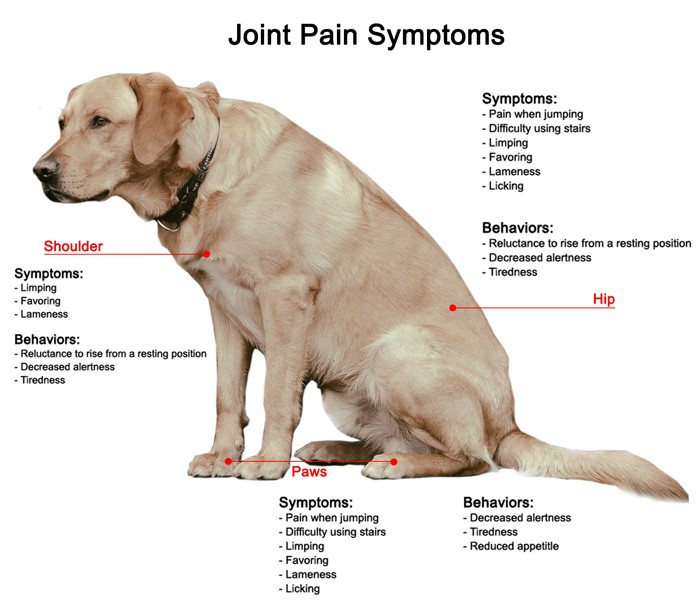Osteoarthritis (OA) is a slowly progressive and irreversible disease involving deterioration of the cartilage within joints. Arthritis is the medical term for inflammation of the joints, while osteoarthritis is the term referring to a form of chronic joint inflammation caused by deterioration of joint cartilage and underlying bone.
Osteoarthritis can range in severity from a mild, intermittent condition causing mild discomfort to an advanced clinical state characterized by constant pain and severe disability.
Causes include old age wear, trauma and congenital defects. Obesity, diabetes and excessive looseness of joints are risk factors for OA and hence ‘degenerative joint disease’ (DJD).


- Limping
- Pain when jumping
- Difficulty using stairs
- Licking joints
- Reluctance to move
- Reduced appetite
- Tiredness
- Decreased alertness
- Decreased activity
- Reluctance to go up and down stairs
- Reluctance to jump or jump the full distance (eg. uses stool and chair to get onto table)
- Decreased range of motion of joints
- Lameness
- Crepitus and discomfort on joint manipulation
- Toileting next to litter tray rather than in it
Treatment Options:
- Diet & Weight Loss
‘Hills j/d and Royal Canin Mobility’ are diets containing green-lipped muscle extract, chondroitin and glucosamine and help maintain healthy joints. It is also a lower calorie food which helps treat obesity and reduce added strain on joints. Obesity is a strong contributory factor, so weight reduction is essential to reduce stress on the joints.
- Oral supplements
- 4cyte is an oral gel or granule containing a plant extract “Epitalis” that is able to stimulate healthy cartilage regeneration, reduce inflammation in oints and repair damaged joints
- Antinol is a capsule containing a derivate of green lipped mussel that can be used in cats and dogs to help treat and reduce arthritic inflammation
- Omega 3/6 Fatty Acids are essential fatty acids not produced by the animal itself. This helps relieve pain due to their anti-inflammatory properties.
- Chondroitin & Glucosamine are key nutrients that makeup cartilage. They can assist in the natural repair and regeneration of your dog’s cartilage.
- PawOsteosupport capsules contain green lipped mussel as well as omega 3/6.
- Exercise
Light activities such as walking and swimming help strengthen muscles while keeping ligaments and tendons flexible. This also helps to prevent obesity and aids in circulating blood to stiff joints. 15-30 minutes regularly is a great start (5 days a week). Swimming is especially great for dogs with osteoarthritis because the water supports much of the body weight and inhibits sudden excessive movements. Hydrotherapy, a fantastic option is available at ‘Dogs for Life’, Carrier Street, Benalla.
- Non-steroidal anti-inflammatory drugs (NSAIDs)
Commonly used pain relieving medications. There are several safe, very effective NSAIDs formulated for veterinary patients. Routine blood and urine testing to monitor organ function (liver and kidneys) are recommended for careful long-term usage and before commencing treatment.
- Chondroprotective Drugs: Cartrophen/Pentosan injections
Chondroprotective agents work to stimulate cartilage repair and inhibit ongoing damage. This is a course of injections commencing once weekly for 4 weeks, with booster injections every 3 months.
